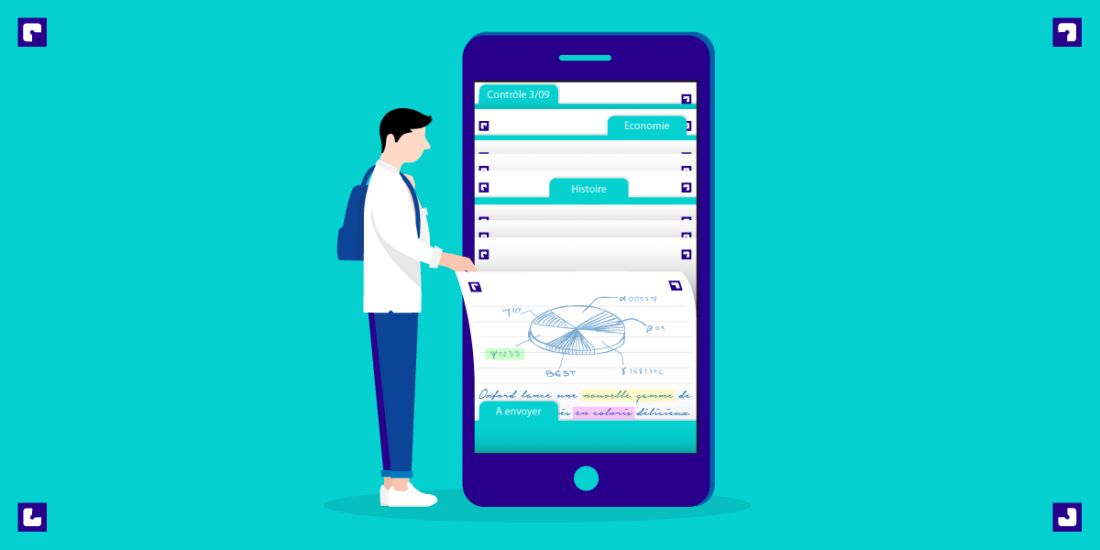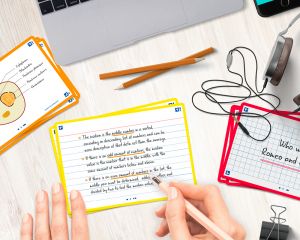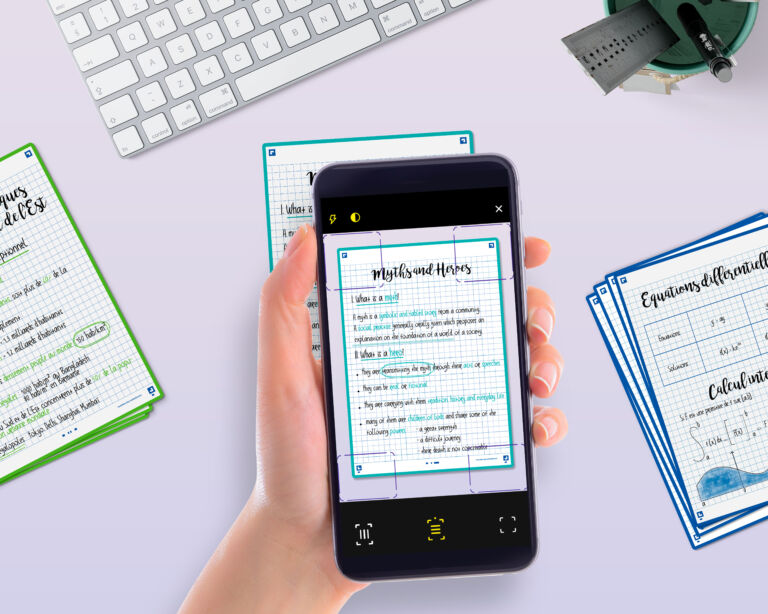
With SCRIBZEE, your mid-year exams are in the bag!
With mid-year exams fast approaching, it’s time for some serious preparation:you’ll have to get your notes out, make crib sheets and ask around for the lessons you missed. To take the stress out of revision and be ready when the time comes, all it takes is a bit of organisation and… the right app!
Two main types of revision cards can be used. Whilst they don’t have the same format or the same purpose but are both complementary and effective for revision. Let’s find out more about them 👇
Revision cards, your best way to summarise your notes:

Easy-to-memorise, well-summarised crib sheets are the key to productive revision.
As their name suggests, revision cards allow you to easily summarise your notes by noting only key information. They’re ideal for classes with large amounts of notes.
But, how do you make good revision notes? Here are our 5 tips:
- Make a crib sheet for each subject.
- Zero in on the essentials with the key words, figures and concepts. Don’t forget clearly identified headings and subheadings. These will spotlight the most important facts to learn.
- Put lists of dates or definitions on a separate crib sheet.
- Instead of copying out your plan word for word, group important data by theme: this will help you assimilate the information. Simply writing your crib sheet out by hand will also help you memorise it. Easy!
- Don’t forget to add colour, use highlighters, create focal points and text boxes on key notions or exceptions to the rule.
Naturally this is best not left to the last minute. It’s much easier to make your crib sheets as you go, throughout the year, and revise regularly. Why not get together with your friends to do it? Then you can be sure you haven’t left anything out. And if you have an OXFORD connected notebook and the SCRIBZEE app, you can simply scan your crib sheets and store them directly in your “Revision” folder with your smartphone. Then you can study them whenever you like: in the train, in bed or on your sofa. You can even assign them a revision status.
Flashcards are ideal for testing yourself:

Flashcards are also called question / answer cards. The idea is to write a question on the front of the card and the answer on the back. Then, the principle is to quiz yourself (on your own or with friends) to try to find the answer.
But how do you create a flashcard? Here are our 5 tips:
- Write one (and only one 😉) piece of information per flashcard
- Write your question / word on the front and the answer / definition / translation on the back
- Illustrate with diagrams and add colour. It will help you to visually memorise important information
- Read the front of your flashcard and try to find the answer without looking at the back
- Test yourself regularly
With the Oxford SCRIBZEE-compatible flashcards, you can even scan them so you always have them with you and test yourself digitally using the quiz. It’s fast and fun and the app shows you your final score. Ideal for memorising and tracking your progress.
Something missing? Call a friend!
It’s not unusual for even the most conscientious students to miss a few lessons in a year. Even if you haven’t had time to catch up with them, you really don’t want to skip a subject that might turn up on exam day! Of course, you could always make photocopies, but it’s a nuisance and can be expensive. On the other hand, if one of your friends has a SCRIBZEE-compatible connected notebook, he will undoubtedly be happy to scan his notes, before sending them directly to you in SCRIBZEE or by e-mail or SMS.
Ready for the big day
Now you’ve got everything you need on hand and can get down to some serious revision! Draw up a revision schedule and try to stick to it. For example, you might decide to revise two subjects per day, or one subject per half-day.
Don’t forget to take regular breaks: a 20-minute nap, a short walk for some fresh air or an hour’s sport to get rid of any stress. Have a light meal in the evening and get an early night so your brain can assimilate everything you’ve taken in during the day.
When the big day comes, you’ll be ready to give your best!




